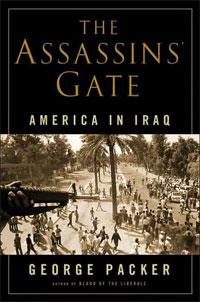Book Notes
 George Packer, Assassins' Gate; America in Iraq (New York: Farrar, Straus, and Giroux, 2005), 467pp.
George Packer, Assassins' Gate; America in Iraq (New York: Farrar, Straus, and Giroux, 2005), 467pp.
Named as one of the ten most notable books of 2005 by the New York Times, many critics consider Assassins' Gate the single best book on the Iraq war. George Packer, a staff writer for The New Yorker, is one of the few so-called "liberal hawks" who supported the war in Iraq: "To give my position a label, I belonged to the tiny, insignificant camp of ambivalently prowar liberals, who supported a war by about the same margin that the voting public had supported Al Gore." When he wrote his book, after most people agreed that the Bush administration had badly bungled both the rationale and the execution of the war, he believed that the Iraqi cause was "winnable." That single comment, he has remarked since the publication of his book, has returned to haunt him.
Packer's narrative begins with the unfinished business of Desert Storm in 1991. Recall that Iran and Iraq fought a war from 1980–1988 that killed a million people. He traces the key personalities and the neoconservative movement that by March of 2002, a full year before the war, had led Bush to declare in an Oval Office meeting that he intended to remove Saddam. From then on "facts" were made to fit that decision. But just why we went to war remains a mystery. Richard Haas, director of policy planning at the State Department under Colin Powell, said he will go to his grave not knowing the answer to that question.
Beyond the complexities of history, culture, and politics, Packer excels at communicating the reality of the war from the vantage points of a wide variety of ordinary stakeholders—the three million Iraqis living in exile (eg, Ahmed Chalabi), CPA staffer Drew Erdmann (A Harvard PhD in history), physicians at a Baghdad psychiatric hospital and the morgue, an American captain who realized that what his soldiers really needed to do was to fix the local sewer system, a twenty-two year old private who was killed and the complex response of his father back home, a young woman student at Baghdad University, citizens in Kirkuk—including the competing claims of Kurds, Arabs, and Turks, and daily life at the CPA (especially the tragic disconnect between headquarters there and everyday realities in Iraq).
Packer documents the infighting between the Defense and State Departments, the administration's disdain for any help from experts, their willful blindness, and the flagrant neglect of plans to rebuild Iraq. The war, as he reminds us, was not inevitable, and unfortunately our poisonous political climate here in America makes it very difficult to discuss Iraq beyond the purpose of proving yourself right. Packer shines because he constantly returns to the nightmare that has befallen ordinary Iraqi people. So, although he supported the war as a "liberal hawk," almost 500 pages later he concludes: "I came to believe that those in positions of highest responsibility for Iraq showed a carelessness about human life that amounted to criminal negligence."


